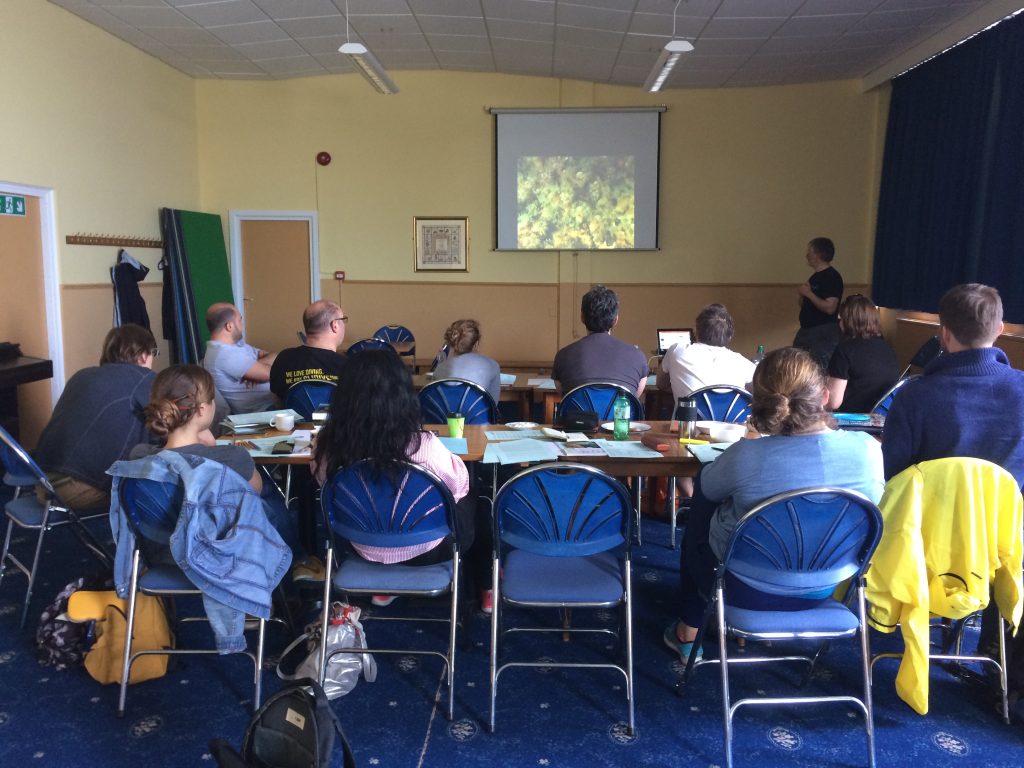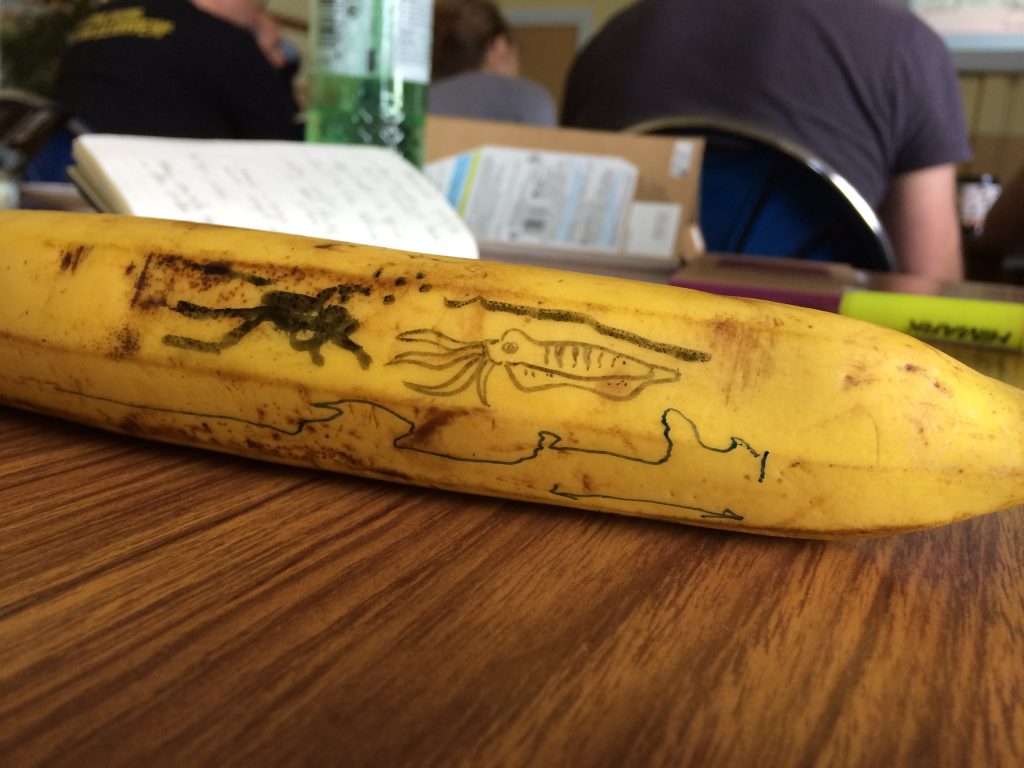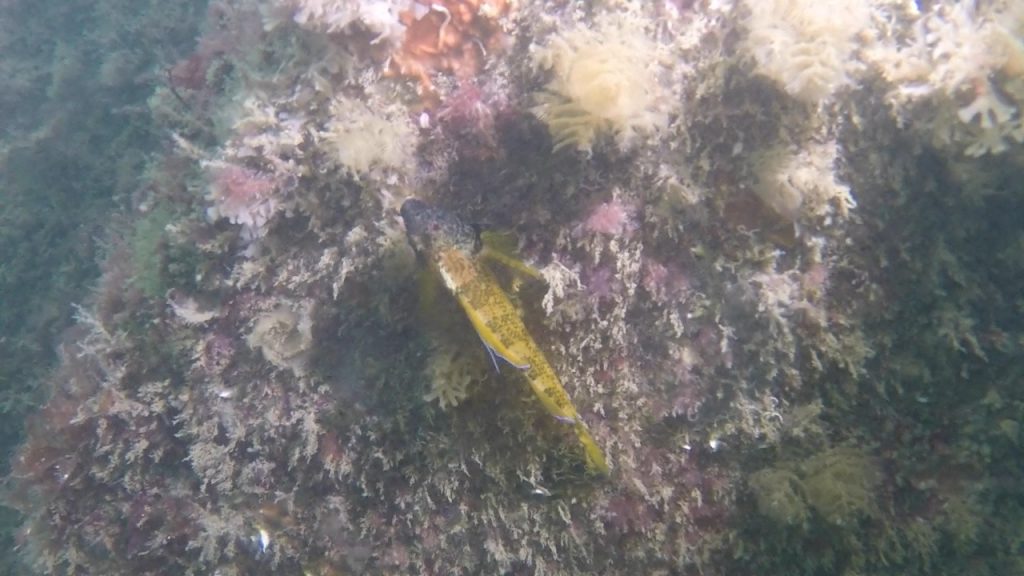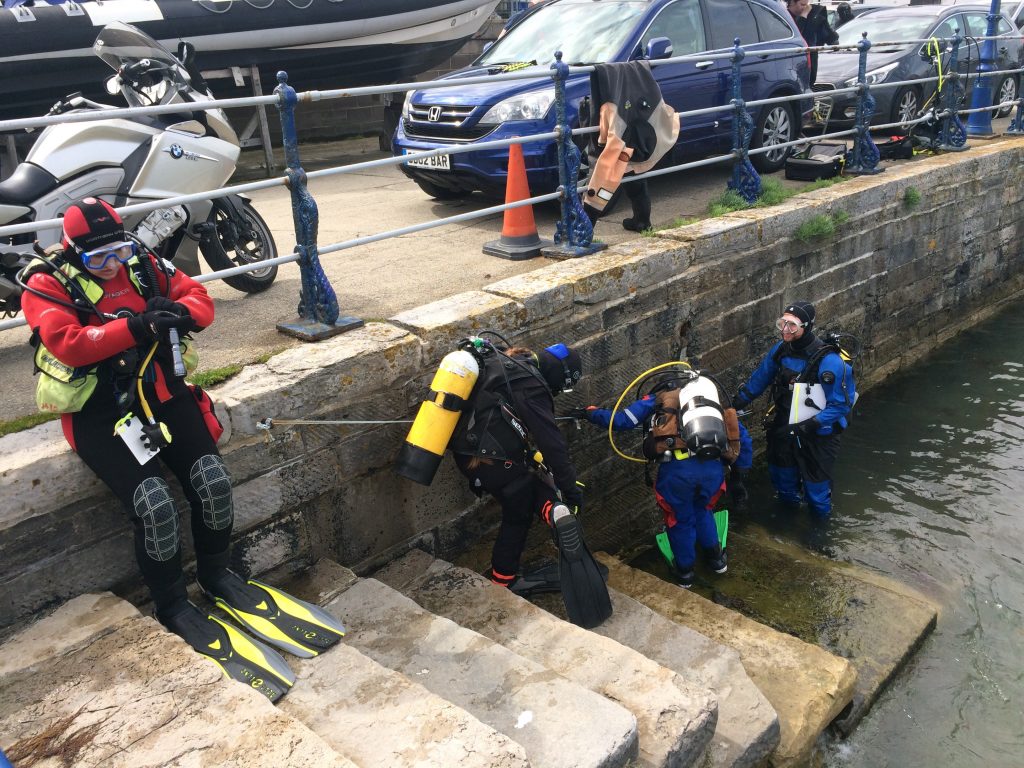By Simon Ellis
We arrived in trickles: by train, bus, van and car. Some pints at the Globe Inn, some close quarter sleeping in the paper-thin caravan walls at the Swanage Coastal Park which is (in truth) comfortable and ideally located on the hill overlooking Swanage.
In the morning Steve cracks into bacon and eggs, and Giovanni sorts out the caffe latte. A smoke alarm ensures we are all very awake. There are 16 of us in total in Swanage. Four separate off to Go Diving in Dorset off of a hard boat: Richard just back from Argentina getting some UK diving under his belt, Preeda regaling the group with stories of the training trip to Lanzarote, and Mark O (looking for a brief break from the kit cupboard) and Tomek arrived bright and early Saturday to stay in the relative luxury of a BnB.
The remaining 12 (Pippa, Peter, Katie, Simon, Anastasiya (refreshing the course), Sasha, Marysya, Claire, Jon, Mark, Giovanni, Steve, are budding Seasearchers, and in the morning on Saturday we are treated to a couple of slide decks that help to equip us with some basic marine life spotting skills: try and get photographs/videos, common names are OK, seaweed is awesome, algae are everywhere. There are plenty of new words: sessile, biotopes, maerl, biogenic reefs, (you get the idea). Some of us were in our element, others were wondering how we’d ever remember the difference between a bryozoan and a cnidarian.
The Seasearch team know their stuff for sure, and they make it clear that “citizen scientists” (When I grow up I want to be a citizen scientist.) like us play a vital role in building a more complete picture of marine life and activity, and this in turn provides crucial data in influencing policy and law at government level.
Meanwhile, The Four Go Diving in Dorset team had a couple of great outings and in their afternoon drift dive they claimed that they had seen a massive number of dogfish. They. Were. This. Big. (Call them sharks all you like you four.)
There was an obligatory Saturday night meal at a pub and then what appeared to be a methane-monitoring alarm was set off three times on Sunday morning in Caravan 10. I can still see Richard reaching up in his boxers (It’s burned into my retinas.) to silence the alarm, and by the third time he is a total “silence the alarm while wearing boxers” champion.
On Sunday the Seasearchers do two qualifying dives under quite demanding conditions. All we wanted was a little “strength and stability” to try out our Seasearch trainer wheels, and what we got was some shakily cobbled together (and rapidly descending minority Government at 3 metres. There was a lot of yo-yoing, kind of like a Thursday night pool dive but with no visibility, strong tide, a lot of seaweed, and fewer hair bands (Well, there might have been, but there was no chance of seeing them.). It was, in truth, like being in a seaweed washing machine (Thanks Katie for the image).
Meanwhile, the same day, Four Go Diving in Dorset headed out bright and early and when they return they are smiling and seemed pretty goddam relaxed. Perhaps this is because they hadn’t dived in 3 metres of green-brown-red mush while scribbling on slates.
Seriously, the thing about Seasearch dives is that they provoke you to slow down, to focus your attention on the micro and macro details of the dive; to start tuning into the extraordinary diversity in even small-nearly-invisible areas; kind of like being asked to look underwater with new eyes. The dives were exhilarating and they felt worthwhile, as if we were part of a bigger project of conservation, information, and communication. I urge you to do the Seasearch course if you haven’t already: it adds an entirely new and remarkable experience to being weightless underwater (And you get to draw.).
And then it was over. Mark O and Tomek were off, so too Jon and Mark; Steve and Preeda got away OK in the van (packed to the gunnels), Richard sped off into the sunset, and the remaining nine made the 19:20 train to Waterloo. Giovanni bought Pippa a very large celebratory bottle of beer and that was pretty much good night nurse for Pippa.
Our Seasearch tutor Nick Owens (with help from Cathryn Quick on Saturday) was patient and outrageously knowledgeable. We owe him tremendous thanks for his (mostly) voluntary work, and his warm and caring spirit. And of course big big thanks to Pippa for organising a fantastic adventure, and to Steve for some awesome and clear dive-management, and for hauling the kit between London and Swanage.
Links
Seasearch: <http://www.seasearch.org.uk>
National Biodiversity Network Atlas: <https://data.nbn.org.uk>
Dorset Research: <https://www.dorsetwildlifetrust.org.uk/dorset_seasearch.html>
DORIS mapping the seabed: <https://www.dorsetwildlifetrust.org.uk/doris.html>





 We are an LGBTQIA+ friendly club
We are an LGBTQIA+ friendly club